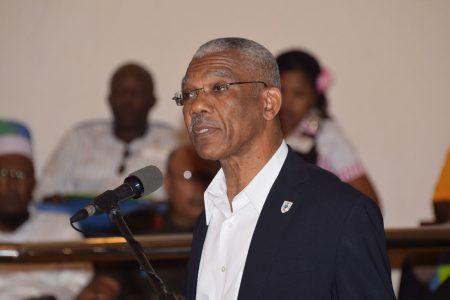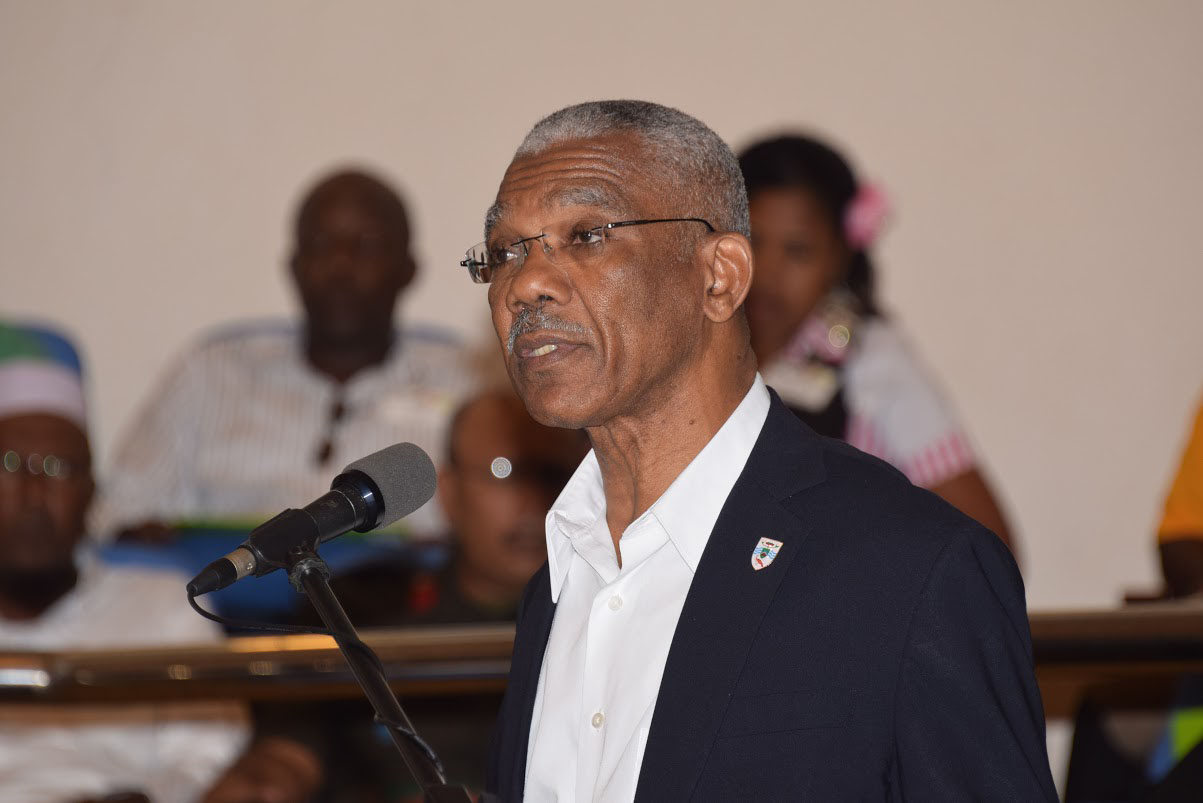As part of its legislative agenda in the new parliamentary session, the APNU+AFC administration will be moving to strengthen anti-corruption legislation, President David Granger said yesterday.
Granger made the announcement during his address to the National Assembly, where he said the administration would be pursuing a “vigorous legislative agenda” for the remainder of the year and in 2018.
“Corruption is corrosive to the common good. It subverts institutions, inflicts injustices and impairs good governance. Your government intends, with your support, to enact legislation aimed at strengthening our anti-corruption effort. We also shall pursue regulations intended to fortify our system of local government,” he said.
He mentioned the Protected Disclosures Bill, which is intended to ensure the protection of whistle-blowers. He noted that the bill, which was due for first reading yesterday, is intended to “combat corruption and other wrongdoings by encouraging and facilitating disclosures of improper conduct in the public and private sectors….”

The government had been accused of targeting one such whistle-blower, nurse Sherlyn Marks, who had reported that a region five councillor with close ties to the government, was using her position to access painkilling drugs. The nurse was instantly transferred by the Region Five Regional Executive Officer when her complaint was publicised by PPP/C MP Harry Gill.
Granger also said the government would be amending the Integrity Commission Act to ensure the independence of the Integrity Commission. The amendment of the legislation is also expected to see the introduction of a code of conduct for ministers and other holders of public office. The code was one of the campaign promises of the administration.
According to Granger, the government will also be modernising and updating existing legislation in line with international best practices. He mentioned legislation to modernise defamation laws to include, among other things, defamation “via online/internet” sources of communication.
He said the Guyana National Bureau of Standards (Amendment) Bill will promote a modern framework to enhance the functionality of the Guyana National Bureau of Standards, while a Solid Waste Management Bill will be laid to promote the modernization of the regulatory framework for solid waste management.
Additionally, he said the “outdated” Antibiotics Act of 1951 will be upgraded to cover both medical and non-medical use of antibiotics, while the Nurses and Midwifery Bill will replace the “archaic” Nurses and Midwifery Ordinance of 1951, and a Health Promotion and Protection Bill would replace the Public Health Ordinance of 1934.
The Pharmacy and Poisons Ordinance will be repealed and the functions and licensing of Pharmacies will be incorporated into the Food and Drug legislation, he also noted.
Granger also said a Health Information Systems Bill will be introduced to regulate electronic information storage and retrieval of personal and medical data.
Another part of the government’s legislative agenda, the president noted, would be improving justice administration. In this regard, he mentioned the Witness Protection Bill, which will provide for the establishment of a programme for the protection of certain witnesses and other persons and to provide for related matters, and the Juvenile Justice Bill, which will make provision for the establishment of facilities for the custody, education and rehabilitation of juvenile offenders.
He said too that the Guyana Prison Service (Amendment) Bill will allow the Guyana Prison Service to transition from “a primitive, punitive force into a rehabilitative and correctional service.”
In addition to justice administration, Granger said the government would be improving the regulatory framework of the economic sectors.
“Legislation will be introduced to support the regulatory framework for Guyana’s incipient petroleum sector,” he said, while noting that the Petroleum (Exploration and Production) Bill will replace the 1986 Act of the same name and a raft of regulations will also be made to support the emerging petroleum industry.
He added that the institutional framework of the mining, telecommunications and business sectors would also be enhanced and cited the Mining (Amendment) Bill to provide for improved and sustainable management of the mining sector, and the Guyana Gold Board (Amendment) Bill to improve the regulatory framework of the Guyana Gold Board and result in improved price recovery and increased gold declarations.
He said too that trade facilitation and the regulation of e-commerce are expected to be boosted by the passage of the Electronic Single Window System and E- Commerce Bill and the Electronic Communications and Transactions Bill, while amendments to the Small Business Act which will allow for small businesses to benefit from all types of government contracts.
He also detailed plans to ensure the state’s compliance with international treaties and agreements.
Towards this end, he mentioned the Caricom Draft Model Consumer Protection Bill that is intended to promote consumer welfare and protection and the enactment of legislation to treat with refugees in keeping with the country’s accession to the 1951 United Nations Convention Relating to the Status of Refugees, including its protocol of 1967.
He added that the government will also be bringing legislation to prevent the trafficking in weapons of mass destruction and to fulfil its obligations under international trade agreements, including those between Cariforum and the European Union.
Granger said that the administration’s legislative agenda would also entail the finalising of bills already before the House, including some that are before parliamentary select committees.
These include the Cybercrime Bill 2016; the Food Safety Bill 2016; the Animal Welfare Bill 2016; the Civil Aviation Bill 2017; the Constitutional Reform Consultative Commission Bill 2017; and the Petroleum Commission of Guyana Bill 2017.






